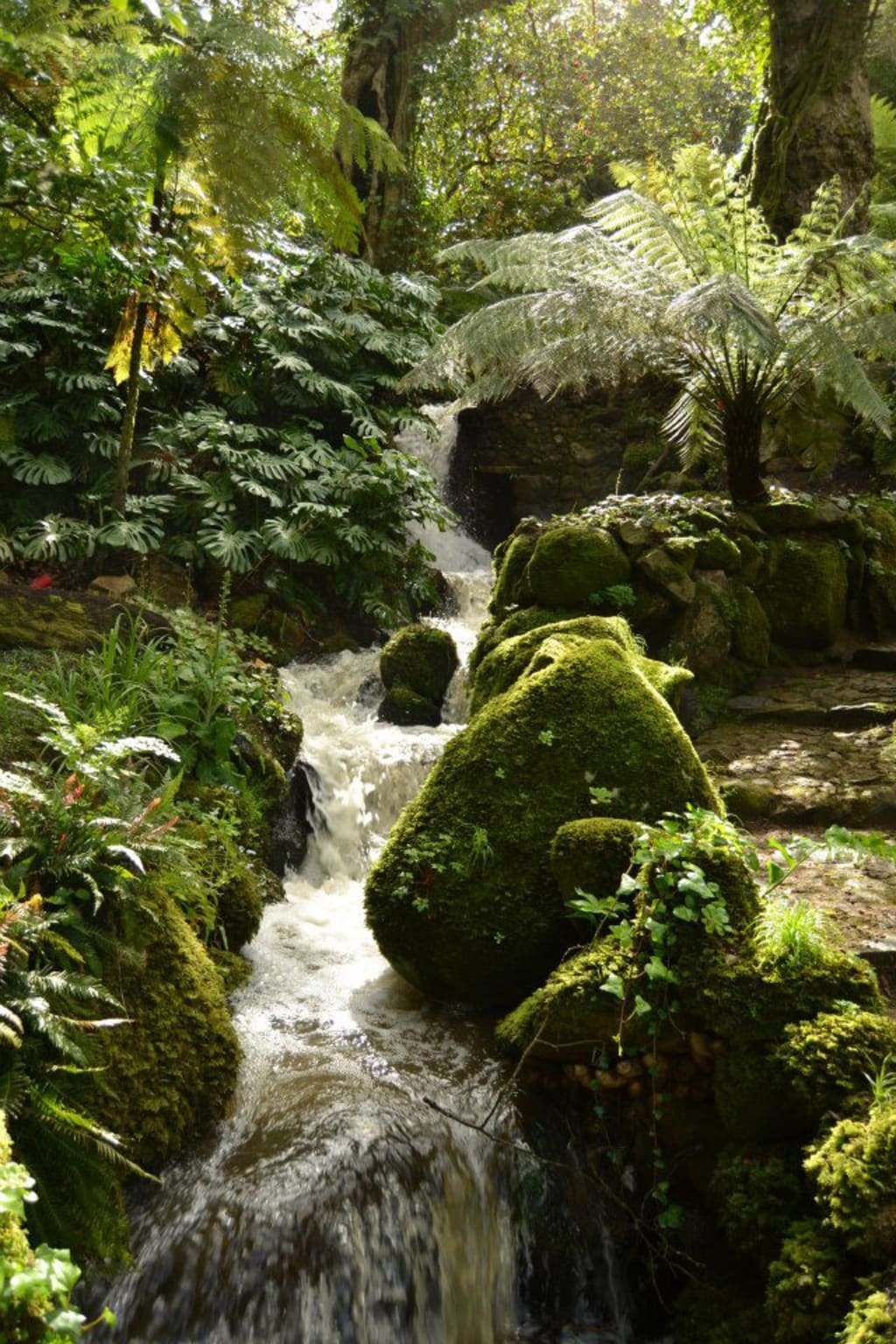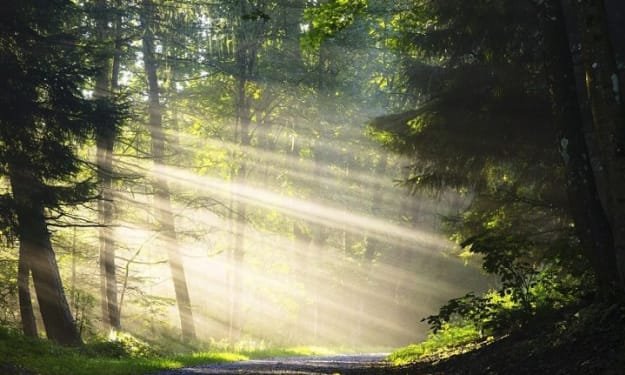
“We abuse land because we regard it as a commodity belonging to us. When we see the land as a community to which we belong, we may begin to use it with love and respect.” – Aldo Leopold, A Sand County Almanac (Rome, 241).
Imagine yourself walking through an old forest of oak and fir—the soft, vibrantly green, mossy carpet, like a pillow beneath your feet. The forest floor is not barren by any means. Besides the mossy carpet, there are many kinds of ferns and fallen branches, barely discernible beneath their blankets of moss, vine, and fungus. Wild herbs, berries, countless other flowers, and the like, make their homes betwixt the massive trees. If you listen, you can hear the music of the forest—the whispering wind, the singing birds, the pitter-patter of little feet, and the rustling of leaves as a squirrel rushes through the trees leaping from one to another, the constant hum of insect wings, the distant cry of an eagle. You can hear, in the not so far distance, the constant, soothing flow of a nearby creek. This vast matrix of sounds creates a symphony of sorts. The sight, too, is breathtaking. The sun shines brightly high above—its light filtering down through the canopy casts an almost surreal glow throughout the forest. This place is a haven, for you and all the creatures who call it home. Within these woods a sense of spirit and life permeates everything. It is both indescribable and unmistakable. The ebb and flow within this space are reminiscent of a heartbeat—the heartbeat of nature herself—the heartbeat of the earth. It is a timeless place, or so it feels, continuing in this vane for all eternity.
Although it feels everlasting, one morning the modern world catches up with it. Instead of the sacred symphony of the forest, the loud roar of chainsaws, the rumble of heavy machinery and loggers’ voices, shouting above the constant din of the modern, industrial, mechanistic world can be heard. Soon, thunderous crashes can be heard, as these proponents of industry and market fell the trees, desecrating what was once a sacred place. By the end of the day, nothing is left of your little grove within the forest.
Day by day, the destruction continues until finally, the last tree falls, the last heartbeat beats, and then nothing. The all-encompassing silence is not one of stillness but one of death: cold, unforgiving death. All that you once loved about this place is gone, either fled or trampled. For what reason has this happened? What possible good can come of such destruction?
A sacred place has been desecrated. Countless inhabitants are without a home, but why? The answer is separation. The people who owned the land saw it not as a place of beauty and life, but rather as a set of resources to be exploited. Perhaps they would not use the word exploit, for such a word conjures up images of self-interest and greed. However, it is inevitably for these very reasons that the land was stripped of its trees. Actions such as these are made possible, without a sense of remorse, because of an ideological foundation of separation. Such a previously serene landscape can be seen as a wealth of resources instead of a living organism primarily because of the prevailing attitude of domination, which abstracts nature into a commodity rather than an entity in its own right.
These events happened a little over a decade ago, but they are far from isolated. Similar actions take place on a regular basis today. Beyond the question of why, is, in many ways, an even more important question of what. What is it that gives humanity the right to exploit nature? What is it based on? What are the ideologies that justify or legitimize such an action?
In many ways, ideologies form the foundation upon which ones’ actions are based. With that in mind, it is important to understand the ideologies behind something, especially if any element of change is to be reached. For the sake of this argument, we will look at the primarily western dominionistic ideology and its contrast with a more sustainable, holistic perspective. It is through this religiously inspired sense of man’s dominion over the natural world that the modern capitalistic market economy exerts its exploitation of nature.
We will begin our journey, so to speak, with Gilbert White—the “quiet, unassuming, unambitious” curate of Selborne, England—the defining characteristic of which is “an apparent mutual tolerance between man and nature” (Worster, 4). White was a proponent of an Arcadian ideology towards nature. Arcadianism is a more holistic, pagan perspective of man’s relationship with the natural world around him. It is born out of the “mountainous region in ancient Greece called Arcady, whose inhabitants supposedly dwelt in an Eden-like state of innocence, at peace with the earth and its creatures” (Worster, 471). Arcadianism is, in historian Donald Worster’s words, “an ecological ethic of coexistence rather than domination; humility rather than self-assertion; man as a part of, rather than superior to, nature” (Worster, 471).
Arcady, even more than other areas of ancient Greece, was deeply rooted, ideologically and religiously, in nature. The Hellenics of Greece considered the inhabitants of Arcady to be direct descendants of the original tribes of Greece. Their chief deity, Pan, is an example of the complete interconnectedness of their society with the natural world around them. His body molded together that of a satyr, the torso and head of a man, and the legs and horns of a goat: he is the god of the forests, pleasure, and lust. One of his famous recorded feats was of the time he seduced Selene, goddess of the Moon, by playing his pipes—panpipes. Their love was so strong the spirit of it permeated the entire countryside, bringing with it a sense of rapture and wholeness to everyone and everything. Pan represents many of the pagan aspects that Judeo-Christian religious perspectives directly equate as sinful. His conjunction of human and animal represents a manifestation of the more, for lack of a better term, animalistic aspects of human nature, particularly in his sexual appetite. With this in mind, it’s not surprising that during the early centuries of the Church, he was demonized and his visage was used to represent the Christian devil, Satan. The symbology within Pan and this hijacking of his character adequately represent the dogmatic ideological outlook of Western monotheism on the natural world.
Selborne, however, was not Arcady. White did not deify nature, nor did he take a sense of sexual license, but he did have an innocent love for the serenity of the natural world around him. He was “a man eager to accept all nature into his parish sympathies. [This] desire is what the rediscovery of Pagan literature in the eighteenth century was primarily about: a longing to reestablish an inner sense of harmony between man and nature through an outer physical reconciliation” (Worster, 10). In many ways, White recognized this interconnectedness and interrelatedness of nature, but he was still a Christian curate. He also studied the natural world and classified it based on a utilitarian perspective (Worster, 9). In some ways, he may seem to be a walking contradiction – a contradiction between his Christian utilitarian perspective of the natural world and his embodiment of “the ancient Arcadian dream of reanimating man’s loyalties to the earth and its vital energies” (Worster, 9). Somehow he managed not to be a self-contradiction though. This conflict between utilitarianism and holistic Arcadianism is reminiscent of the millennia-old conflict between pagan naturalism/animism and Christian domination. Throughout Late Antiquity and the Medieval Eras, Christianity demonized pagan practices and beliefs, their deities, and rites. They blamed all sorts of disasters on pagans and witches, who were eternally connected to nature (Merchant, 103-106).
Regardless of this conflict and demonization, pagan literature, particularly that of the Greeks and Romans, was making a comeback in White’s time. But now, centuries removed from their prime of life, these pagan ideologies had the scientific and industrial revolutions with which to contend. These revolutions, in conjunction with the prevailing Christian ideologies of man’s domination of nature, emphasized and bred a mechanistic worldview in which the natural world, and everything in it, is reduced to mere parts in a machine. In this, the process of the abstraction of nature was, in essence, complete. She ceased to be a spirit-filled being and became an inanimate object. It is against this “arrogance of technological civilization toward nature” (Worster, 20) that Arcadian ideologists fought.
Even though Henry David Thoreau is historically considered a transcendentalist, he exhibits much more fully than White the inherent ideologies of Paganism and Arcadianism. Transcendentalism was a nineteenth-century American school of idealist philosophy. One of its main foci was the celebration of “nature as an inspiring reflection of the divine ‘one’ or ‘oversoul’, while at the same time regarding it as an imperfect, even degraded, sphere to be ‘transcended’” (Worster, 473). This particular perspective was taught by Ralph Waldo Emerson. Thoreau, on the other hand, was, in many ways, able to reconcile this “dualistic stance” more completely (Worster, 473). This capacity on his part is not necessarily surprising considering his more all-encompassing devotion to nature. To him, the degradation was not inherent in nature herself, but rather a product of human interaction with her. Another vastly important lens of thinking and perceiving the world, which greatly characterized Thoreau, is animism, a pagan perspective closely related to the idea of pantheism. Animism is the idea that everything in nature “has an indwelling spirit or consciousness” (Worster, 471). Pantheism goes even further to say that that which is divine resides in all things—or all spirit—and is a fundamental aspect of everything in nature and a part of the divine, a part of divinity. These Pagan perspectives are eternally at odds with the prevailing Abrahamic monotheistic religious teachings, which consider them to be “unacceptable, even heretical concept[s]” (Worster, 471). By rather thoroughly embracing these perspectives Thoreau succeeded in distancing himself from the popular culture of his time. According to Worster, “economic simplicity… was crucial to this strain of pagan animism. To internalize a sense of the great, central life in all nature, one must be directly dependent on the earth in as many ways as possible” (Worster, 109). Thoreau and his colleagues within Romanticism were “a new generation [seeking] to redefine nature and man’s place in the scheme of things” (Worster, 81).
So, what is “man’s place in the scheme of things” (Worster, 81)? (From this point out the term Pagan, unless otherwise specified, will refer to the totality of animistic, Pagan, Pantheistic, and Arcadian perspectives, unless in reference to a person.) From a Pagan perspective, humanity is a part of rather than apart from the totality of nature. In a sense, nature supersedes us authoritatively, particularly in that she is vaster than we are in terms of scope and our existence is entirely dependent upon her. She is in no way truly dependent upon us. She would survive without us, probably even thrive, but we cannot survive without her. Regarding the pagan principles that influenced Thoreau, at their heart is “the belief that nature is a single organic being animated by an indwelling vital principle” (Worster, 81). This “vital principle,” or spirit, can be difficult for the modern detached mind to comprehend. It is far more vast, all-encompassing, and permeating than anything an analytical, scientific perspective has to offer. Taken to its fullest extent, nothing resides outside or apart from this “vital principle”, nothing including humanity. To a common pagan the essence that is nature would not be described as a principle. The idea of principle is far too mundane. To a pagan, the permeating element of nature, the essence of nature herself, is Spirit, which is divine.
One of the many influences that shaped Thoreau, and in turn his perspectives and prevailing ideological legacy, was the landscape in and around Concord, Massachusetts, in which he grew up. Of special importance to him was the forest, or rather the more general lack thereof. In its prime, before English settlement, the countryside “was densely [forested with] an almost unbroken green canopy” (Worster, 67). It was much like our forest—our safe haven—yet older still. The trees were giants even by much of our standards today, and the forest, beyond its mere grandeur, was vastly populated (Worster, 67). To some, particularly those of an animistic perspective, it would have been a truly marvelous and sacred place, but the Puritans who settled there “were a race far removed from such pagan superstitions” (Worster, 67). This magnificent forest had much the same experience as our own, though, due to the difference between modern and colonial woodcutting equipment, the process took much longer. Between the 1630s and 1700 “over half a million acres of New England woodlands had been cleared for farming … and by 1880, only 40 percent of Massachusetts could be classified as wooded land” (Worster, 67). With deforestation always comes the displacement of countless creatures that once called it home. To Thoreau, this human imposition on the land was a tragedy of sorts. One of his main desires was “to bring the forest back” (Worster, 74). Even if the forest had been reinstated, as some of it was, the damage had already been done and it would take hundreds to thousands of years for it to reclaim its original grandeur, for trees are the eternal teachers of patience; they do not grow up overnight.
In strict conflict with this Pagan love and devotion to nature, is man’s dominionistic perspective. This perspective, at least to those of a Judeo-Christian religious background, is a God-given right, literally. The basis upon which this ideology of human power rests comes from the Bible, Genesis chapter one, verse twenty-eight. In this verse, God clearly tells his human creation to multiply and subdue the earth. He gives them dominion over all living things. The followers of the Judeo-Christian traditions accounted for the vast majority of Thoreau’s world. This ingrained sense of hierarchy was the foundation upon which societies were built and scientific investigation was conducted; the idea that man is superior and all else is inferior, to be used to the greatest advantage (Merchant, 203).
Man’s sense of dominion over, as well as his separation from, nature is the core ideological problem. Combined with the rise of science and the industrialization of society, it separates humanity even further from the natural world. Nature becomes primarily a resource and source of resources at man’s disposal; she becomes a commodity. While an ideology cannot be held solely responsible for the actions of society as a whole—inevitably people are responsible for whatever choices they make—it is the foundation upon which said actions are based.
Works Cited
Merchant, Carolyn. Ecological Revolutions: Nature, Gender, and Science in New England. Chapel Hill: The University of North Carolina Press, 2010.
Rome, Adam. The Bulldozer in the Countryside. New York: Cambridge University Press, 2009.
Sellars, Richard West. Preserving Nature in the National Parks. New Haven: Yale University Press, 2009.
Worster, Donald. Nature's Economy: A History of Ecological Ideas. 2nd. New York: Cambridge University Press, 2008.
About the Creator
A.Moriah
At heart, I am a nature loving, historically enthusiastic, artist and writer.






Comments
There are no comments for this story
Be the first to respond and start the conversation.